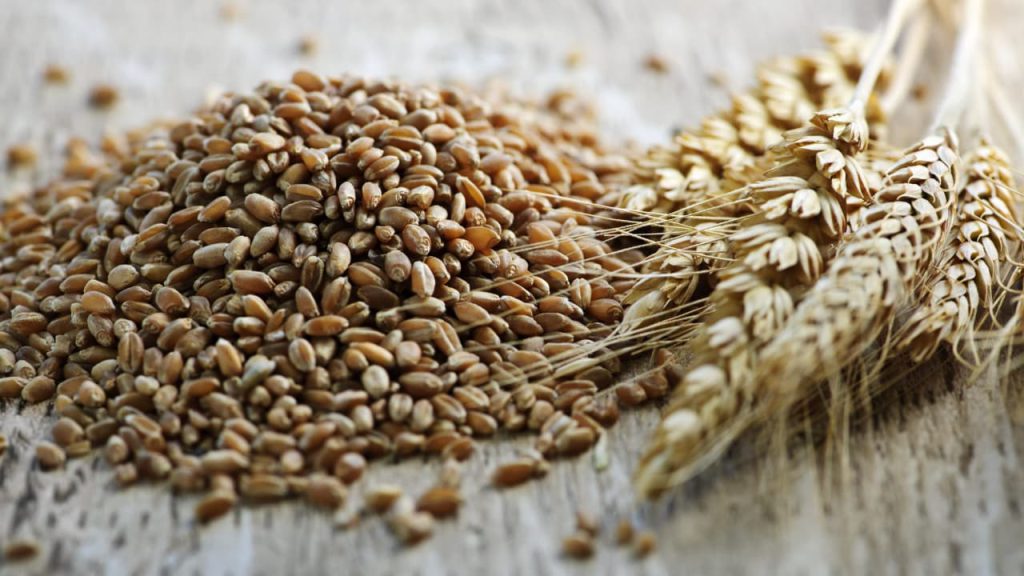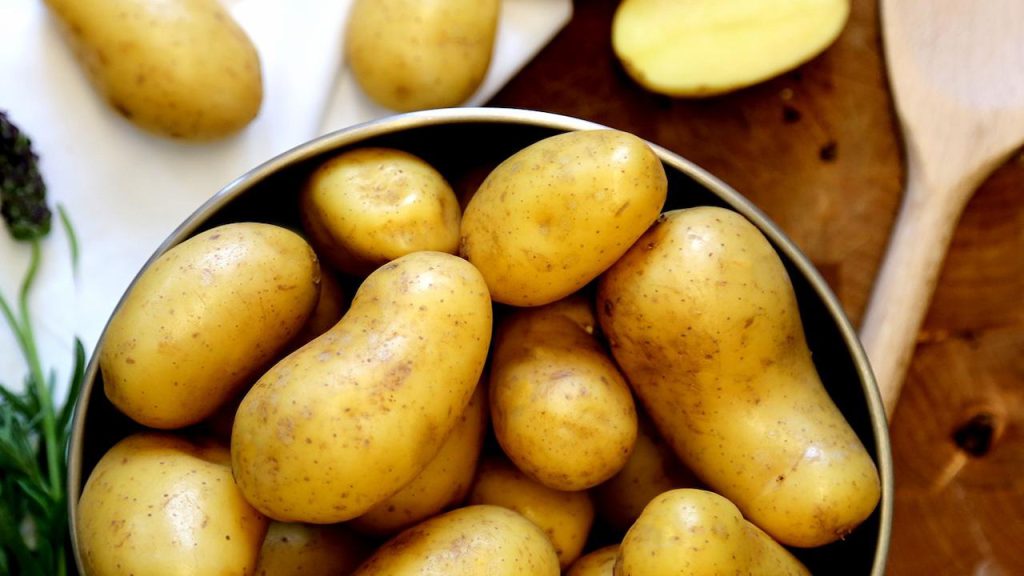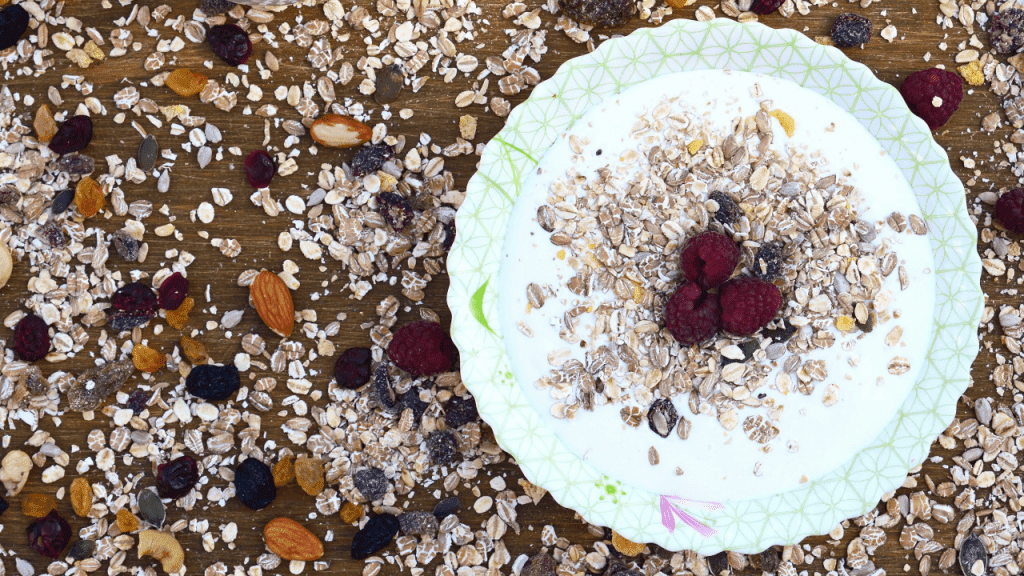Nutrition is an important part of health. It supports development at each stage of life, beginning with pregnancy and continuing through infancy, early childhood, adolescence and adulthood.
Having a balanced diet is about getting the right amount of nutrients (carbohydrate, protein, fat, vitamins and minerals) that you need to stay healthy. People have different nutritional needs at each life stage.
Dairy and dairy-containing foods contribute many essential nutrients including protein, calcium, vitamin A, vitamin B12, riboflavin, iodine, phosphorus and potassium. Therefore, dairy can be an important part of a healthy balanced diet during the life course.
DAIRY AND YOUNG CHILDREN
COMPLEMENTARY FEEDING (WEANING)
Babies grow quicker during their first year than at any other time and need enough energy and nutrients to allow this rapid growth. They only have small stomachs so need nutrient-dense foods to sustain them during growth and development.
Complementary feeding (also referred to as weaning) is when infants are introduced to solid foods alongside their usual breast or formula milk. It is recommended to start at around 6 months of age. Giving a baby a variety of foods during complementary feeding lays the foundation for healthy eating throughout life.
The Department of Health recommends vegetables, baby rice mixed with milk, and fruit as first foods. When your baby is ready, an increasing variety of foods can be offered including iron-rich foods (e.g. meat, fish and pulses). It is important to offer different tastes and textures and to recognise that babies may need to try a new food many times before they accept it.
When can milk be introduced?
- Cow’s milk can be used in cooking or mixed with food from around 6 months but should not be given as a main drink to babies until they're 12 months old. This is because cow’s milk does not contain enough calories and nutrients such as iron to meet your baby's needs
- Pasteurised dairy foods, such as pasteurised full-fat yogurt and cheese, are suitable foods from around 6 months. Full-fat, unsweetened or plain yogurts are a good choice because they don't contain added sugars
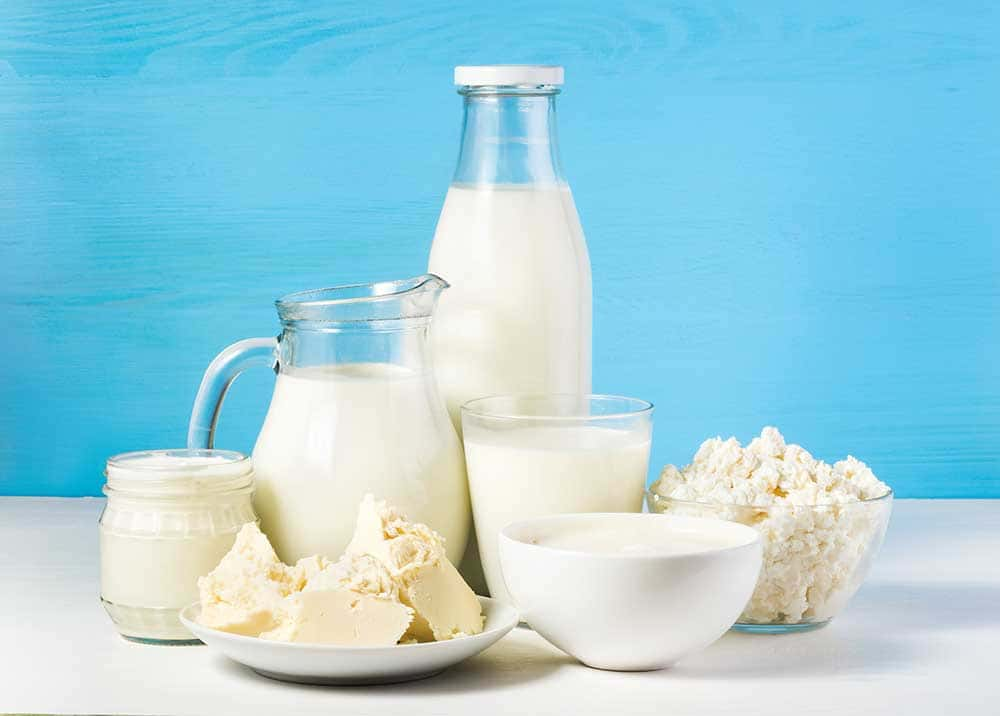
It is important to note that some children may need to avoid dairy products and cow’s milk because their bodies cannot digest lactose (lactose intolerance), or they have an allergy to cow’s milk protein. You can give a child unsweetened calcium-fortified milk alternatives, such as soya, almond or oat drinks, from the age of 1 as part of a healthy balanced diet.
Remember that milk and dairy foods are good sources of important nutrients, so do not cut them out of your or your child’s diet without first speaking to a GP or Registered Dietitian.
1–2 YEARS OLD
From 1 years old whole cow’s milk can be given as a main drink along with full fat yogurts and cheese. These foods are good sources of calcium, a mineral which is needed for normal growth and development of bone in children. Calcium is also needed for the maintenance of normal teeth and makes a good choice to have in place of foods and drinks that are high in sugar.
The NHS recommend giving children at least 350ml (12oz) of milk a day, or 2 servings of foods made from milk, such as pasteurised cheese, yogurt or fromage frais (or fortified alternatives). For more information about introducing solids, click here.
What type of milk can toddlers have?
- From 1 years old pasteurised cow’s milk can be given as a main drink. At this time, it is recommended they have whole milk, as this provides the calories younger children need
- Semi skimmed milk can be introduced from the age of 2, provided your child is a good eater and growing well for their age
- Skimmed or 1% fat milk doesn’t contain enough fat, so it isn’t recommended for children under 5. However, you can use it in cooking from the age of 1
- You can give your child unsweetened calcium-fortified milk alternatives, such as soya, almond and oat drinks, from the age of 1 as part of a healthy, balanced diet
- From the age of 1, milk should always be given in an open cup or free flow cup without a valve as this will help your baby learn to sip and is better for your baby’s teeth
Portion guidance 1–4 year olds
A healthy diet is about getting the right balance of foods and drinks in the right amounts. Knowing how much food to give a young child can be difficult as appetites vary day to day and meal to meal depending on the age, size and activity level of that child. As a guide children need a diet made up of foods from the four main food groups, in the right balance and in portion sizes right for them.
The British Nutrition Foundation’s 5532 guide for 1–4 year olds provides portion size suggestions for a range of foods from each of the four main food groups as follows:
- Starchy foods – about 5 portions a day
- Fruit and vegetables – 5 or more portions a day
- Dairy foods – about 3 portions a day
- Protein foods – about 2 portions a day (3 portions for vegetarian or vegan children)
For more information visit 5532 portion sizes – British Nutrition Foundation.
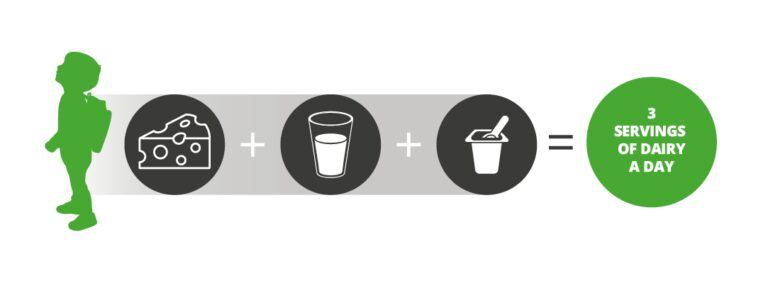
5 YEARS OLD AND SCHOOL AGE
By the time your child is 5 years old they can eat a healthy balanced diet like the one recommended for adults.
The Eatwell Guide shows what we need to eat, and how much, from each food group to achieve a healthy, balanced diet.
You do not need to achieve this balance with every meal, but try to get the balance right over a day or even a week.
The Eatwell Guide does not apply to children under the age of 2 because they have different nutritional needs. Between the ages of 2 and 5, children should gradually move to eating the same foods as the rest of the family in the proportions shown in the Eatwell Guide.
Dairy products, such as milk, cheese and yogurt, are rich in a variety of nutrients. They provide protein, calcium and phosphorous – three nutrients which are needed for the normal growth and development of bones in children. In addition, milk and yogurt are rich in iodine, a nutrient which supports growth in children.
It is important to remember that we build our bone mass through childhood to early adulthood. From mid-adulthood we begin to lose bone mass. Therefore, good calcium intake as part of a healthy, balanced diet throughout childhood and into adulthood, along with plenty of physical activity including exercises for strong muscles and bones, is essential for life-long bone health. For a guide as to how much calcium children need each day see table below.
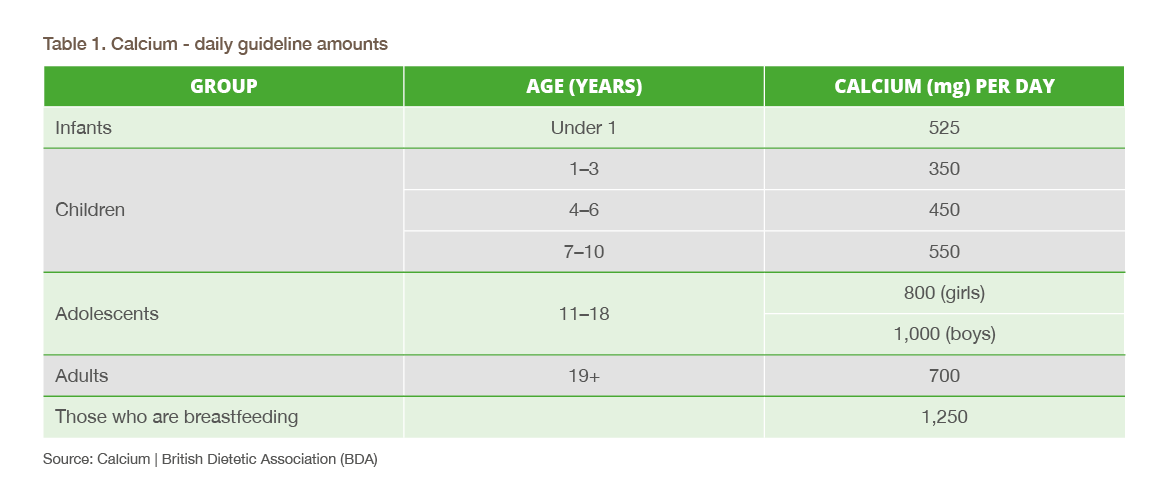
Teenagers
Adolescence is a key period for physical, but also emotional and social development, which lays the foundation for health and wellbeing into adulthood and later life. It can be a time where teenagers assert their sense of independence and try different types of diets. For example they may start to eat food away from the home more often, have a bigger say in family meals, and may also snack on foods and drinks high in fat, sugar and salt, but low in other nutrients.
It is also a time where they may want to experiment more with different diets which eliminate food groups such as meat, dairy or carbohydrates. Eliminating food groups could result in the diet becoming unbalanced and lacking in key nutrients, which are important for growth and development.
Calcium for bone health
Teenagers have a higher requirement for calcium due to the rapid growth period experienced at this time. By the time you reach the end of your teenage years about 90% of bone strength and density has already been achieved, this is known as peak bone mass. Put simply, the teenage years are the best time to ‘invest’ in your bone health. To meet these higher needs 11–18 year old females require 800mg/day and males require 1,000mg/day (see Calcium – daily guideline amounts table above).
The National Diet and Nutrition survey shows on average 16% of 11–18 year old girls are not getting the calcium they need. Dairy products are one of the main sources of calcium in the UK diet. For example, a 200ml glass of semi skimmed milk will provide 30% of an adult’s daily need for calcium, a 125g pot of fruited low fat yogurt provides 20%, and a 30g piece of hard cheese 28%.
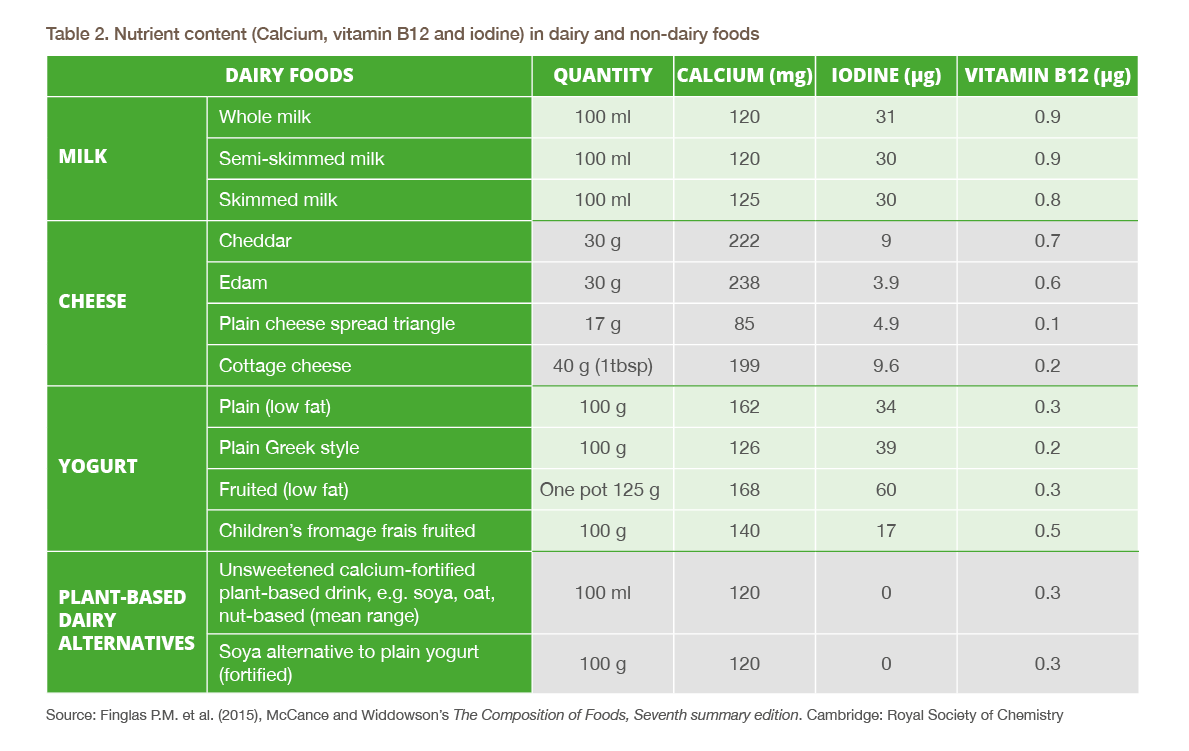
Calcium is also found in other non-dairy foods including sardines (with soft bones), tinned salmon, calcium set tofu, fortified breakfast cereals and breads (white and wholemeal), oranges and green leafy vegetables, such as kale, spring greens and broccoli.
It is worth noting that some plant-based foods such as spinach, dried fruits, beans, seeds and nuts contain calcium, but they also contain inhibitory substances known as oxalates and/or phytates. These substances reduce how much calcium your body can absorb from the food.
Boosting B vitamins
Dairy foods are a source of B vitamins including vitamin B12 and riboflavin (B2), these vitamins have a number of health benefits as shown opposite.
Adults (aged 19 to 64) need about 1.5 micrograms a day of vitamin B12.
Vitamin B12 is only found naturally in animal foods. Milk, yogurt, and cheese are natural sources of vitamin B12.
It is essential that all vegan diets (where all animal sources are omitted) contain a reliable source of vitamin B12 such as vitamin B12 fortified foods eg fortified breakfast cereals and fortified plant based drinks (always check the food label) and a daily supplement.
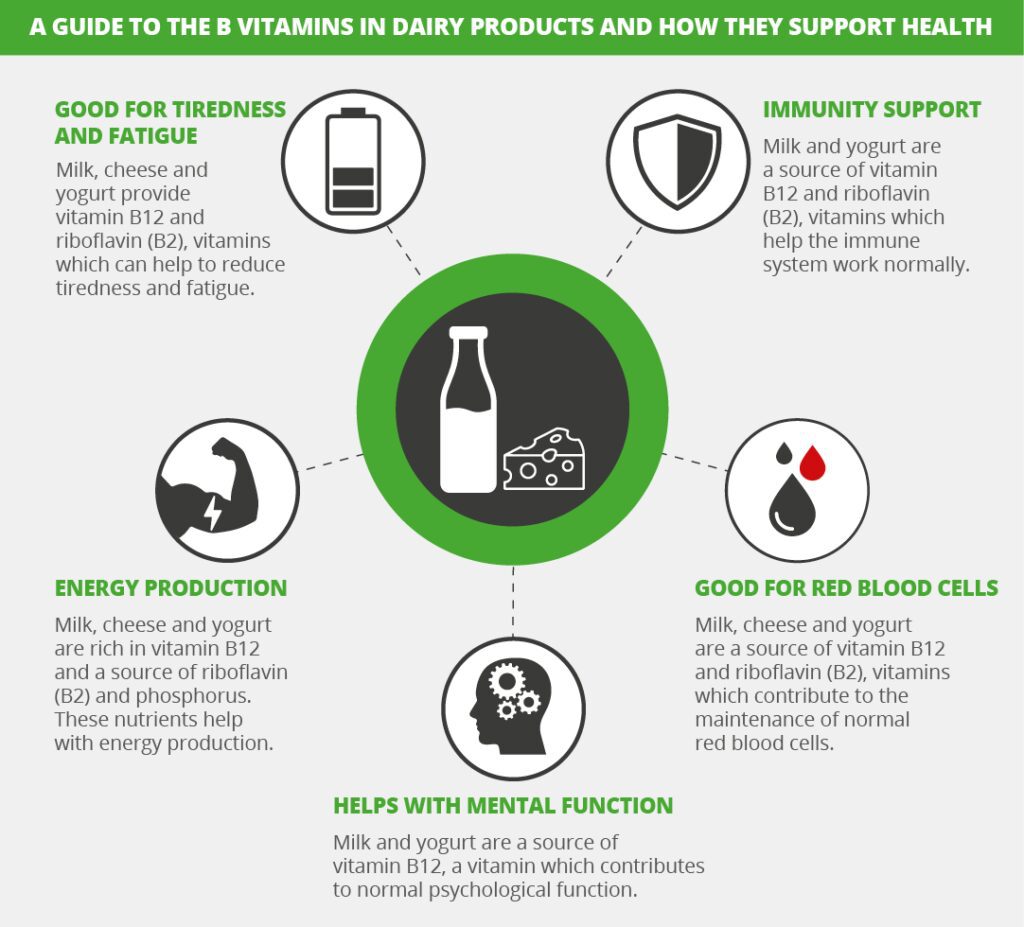
ADULTS
Whether we are in our 20’s, middle years or we are at retirement age, it is important to have a healthy diet and lifestyle to help keep us in good health and avoid developing health problems common in older age. As we enter into our 40’s there are a number of changes happening in our bodies, especially to our muscle and bones.
Dairy and muscle health
Losing muscle is a natural part of getting older. Staying as active as possible, exercising regularly (especially weight bearing exercise) and making sure we get enough protein in our diet can help to slow down the rate of muscle mass and strength that occurs with age. Milk and dairy products are great choices as they are naturally rich in protein, plus they provide calcium and potassium, minerals that contribute to muscle function. On average, dairy products contribute 34% to calcium intakes in adults aged 19–64 in the UK.
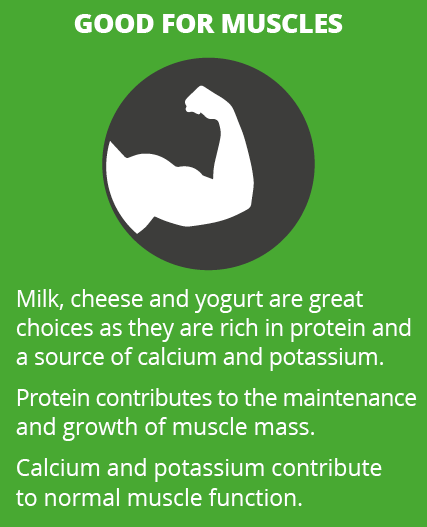
Dairy and bone health
Most bone development takes place during childhood and the teenage years, generally continuing to strengthen into the mid-thirties. Bone mass begins to fall in both sexes from around the age of 35 years. In women, there is a phase of fast bone loss in the 10 years or so following the menopause (when monthly periods stop). This is because after the menopause the level of oestrogen hormone, which protects bones, falls. The decrease then slows but continues throughout the post-menopausal years.
To help keep your bones strong and slow down bone loss as we age, it is important to take regular exercise and maintain a healthy weight. A healthy diet with enough calcium and vitamin D throughout life is important for bone health. There are also many other nutrients including protein, phosphorous, magnesium and zinc that play a part in maintaining normal bones. These nutrients are all readily available from a balanced diet.
Government advice is that everyone should consider taking a daily vitamin D supplement during the autumn and winter. Children from the age of 1 year and adults need 10 micrograms of vitamin D a day. This includes pregnant and breastfeeding women, and people at risk of vitamin D deficiency.
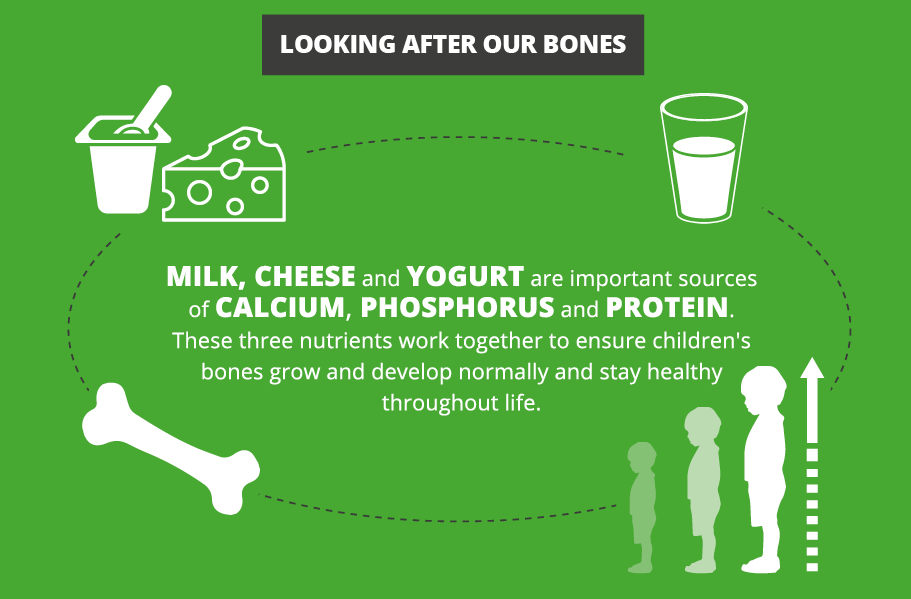
PREGNANCY
A healthy diet and lifestyle are especially important if you’re pregnant or planning a pregnancy. What you eat can not only influence your own health, but it can also affect the short- and long-term health of your baby. You do not need to go on a special diet, but it’s important to eat a balanced diet with a variety of different foods every day to get the right amount of nutrients that you and your baby need.
Being pregnant, you may feel more hungry than usual, but even if you are expecting twins or more, you don’t need to eat for two. Only in the final 3 months of your pregnancy, you’ll need an extra 200 calories a day – that’s the same as two weetabix with semi skimmed milk.
Dairy foods are important in pregnancy because they contain calcium and other nutrients that you and your baby need. Calcium is important for the growth and development of your baby’s bones and helps to maintain your bones as well. Choose low fat varieties wherever possible, such as semi skimmed or skimmed milk, low fat and lower-sugar yogurt and reduced fat hard cheese. If you prefer dairy alternatives, such as soya drinks and yogurts, go for unsweetened, calcium-fortified versions.
There are some cheeses you should avoid in pregnancy, including unpasteurised cheeses. To find out which cheeses you should not eat when you’re pregnant, along with other foods that should be avoided for food safety reasons, click here.
Importance of iodine
Iodine is a mineral that is important for health throughout the life stages. It is a key part of the thyroid hormones needed for many body processes including growth, metabolism and for the development of a baby’s brain during pregnancy and early life. If you may become pregnant or you are planning a pregnancy, you should meet the recommended intake of iodine before pregnancy to ensure that iodine stores are optimised.
Adults need 140 micrograms (μg) of iodine a day. Most people should be able to get all the iodine they need by eating a varied and balanced diet. Good dietary sources of iodine include milk and dairy products, fish, shellfish and eggs.
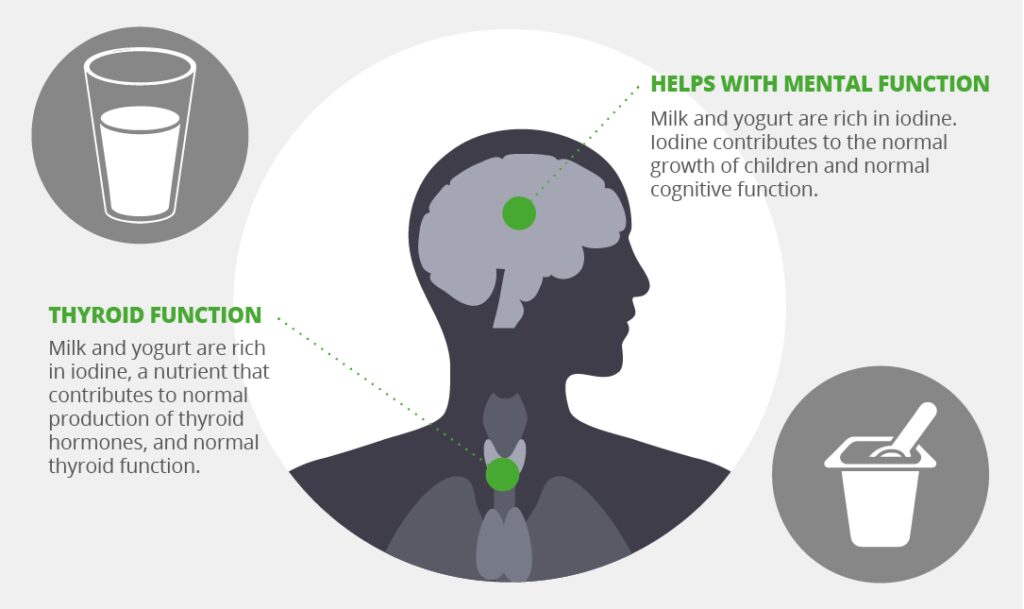
Milk and dairy products are the main sources of iodine for most people in the UK. Some milk-alternative drinks (e.g. soya and oat) are now being fortified with iodine, but it is important to check the product label, as not all are fortified and some have low iodine content.
If you have concerns about meeting iodine recommendations through diet you may want to seek advice from your GP or Registered Dietitian. See table 2 for dairy and dairy alternative sources of iodine.
Along with eating a healthy balanced diet there are two vitamin supplements needed during pregnancy: folic acid and vitamin D. Those who follow a vegetarian or plant-based diet may need to take additional supplementation of iodine, omega-3 fatty acids and vitamin B12. For more information, click here.
PLEASE NOTE: It is recommended that anyone with any special dietary requirements or medical needs should consult with a Registered Dietitian on how to adapt the Eatwell Guide to meet their individual needs.














